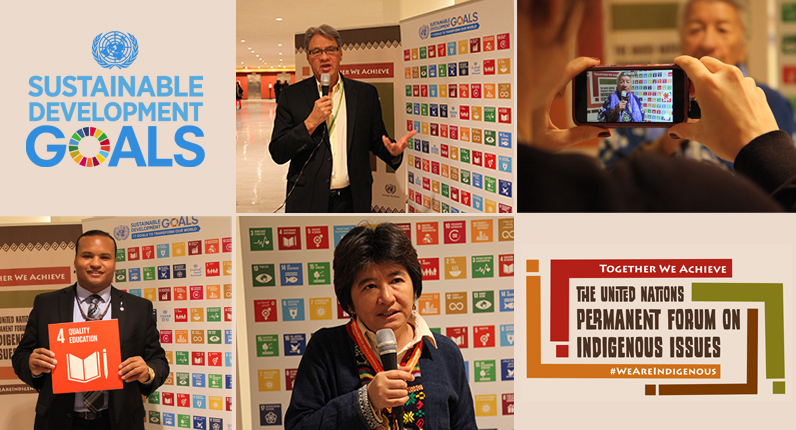
Indigenous peoples make up 5 per cent of the world’s population, but 15 per cent of the poorest. They lag behind on almost every social and economic indicator and continue to face persistent marginalisation. As a broad and universal policy agenda that endeavours to reach the furthest behind first, the 2030 Agenda for Sustainable Development must therefore ensure the inclusion of indigenous peoples at all levels of its implementation to address the inequalities that they face.
At an interactive panel discussion entitled “Moving Forward: Securing the rights and contributions of indigenous peoples in the 2030 Agenda,” participants exchanged proposals on how to guarantee that indigenous peoples are not left behind in the implementation of the Sustainable Development Goals (SDGs), and how to enhance their roles and contributions to sustainable development. The event was held on 15 July at UN Headquarters in New York alongside the High-level Political Forum on Sustainable Development, and was organised by the Secretariat of the Permanent Forum on Indigenous Issues (SPFII) and the International Fund for Agricultural Development (IFAD), in cooperation with the Permanent Mission of Australia to the United Nations.
In her opening remarks, expert member of the Permanent Forum on Indigenous Issues Ms. Joan Carling spoke of their substantive inputs to the 2016 High-level Political Forum. In particular, she highlighted the need to implement the 2030 Agenda with full respect for the rights of indigenous peoples, the importance of data disaggregation across indigenous identity to measure and make visible the progress across all SDGs for indigenous peoples, and the need to ensure indigenous peoples’ participation at all levels.
Mr. Sean Batten, Director of Global Development Policy at the Australian Department of Foreign Affairs and Trade (DFAT), discussed Australia’s experience with its “Closing the Gap” framework which commits to addressing the disadvantages faced by Indigenous Australians in life expectancy, child mortality, education and employment. Embedded as a series of national partnership agreements between all levels of Australian government, the framework outlines how the gap between indigenous and non-indigenous Australians is calculated, how the targets are measured, the agreed trajectories between the baseline and the target year to monitor whether the target is on track, and how these targets intersect with mainstream policies and programs. Mr. Batten highlighted the importance of these partnerships in developing a single performance plan with common indicators and measures of success under a unified reporting structure to enable the comparability of data between different jurisdictions. This allows governments and Australian society to determine whether progress is being made at a national level, and provides a strong evidence base to inform future investments and resource allocations.
Ms. Alicia Bárcena, Executive Secretary of the Economic Commission for Latin America and the Caribbean (ECLAC), stressed the need to disaggregate data according to indigenous identity across all goals. She explained how ECLAC offers technical assistance to the region’s countries to support the inclusion of questions regarding indigenous peoples in censuses and administrative records, and how it produces and generates updated knowledge with the collaboration of indigenous organizations that is featured in numerous studies and a specialized database. The results of this work give indigenous peoples increased visibility in censuses and provides more data that can be used to analyse inequalities related to income, gender, education, health and other gaps to which indigenous peoples are exposed. For example, on average, without distinguishing between educational levels, the income of men who are neither indigenous nor Afro-descendant quadrupled that of indigenous women and nearly doubled that of Afro-descendant women.
Of the 169 SDG targets, 73 are related to provisions of the United Nations Declaration on the Rights of Indigenous Peoples (UNDRIP) and the International Labour Organization Convention 169 on indigenous and tribal peoples’ rights. While indigenous peoples participated in the global consultation process to formulate the 2030 Agenda, it is now essential to actively engage them in its implementation.
To learn more about this event, please click here
To learn more about our work on Indigenous Peoples, please visit: www.un.org/indigenous
Source & Copyright: UNDESA DSPD
 Welcome to the United Nations
Welcome to the United Nations